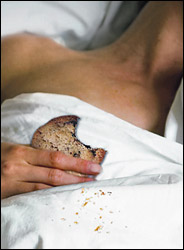A sleep disorder may drive people to use sleeping pills on a regular basis. Even though all efforts are made to minimize harmful side effects, emerging medical case studies are uncovering disturbing findings with the use of the sleeping pill Ambien (zolpidem). While many users report no incident with the use of this medication, others are developing a sleep-related eating disorder. They rummage through their fridges and indiscriminately consume calories ranging into the thousands. The night eaters have no recollection of their nocturnal foraging, but thy will find telltale signs of food leftovers and snacks on counters and even in their beds. Dr. Mark Mahowald, director of the Minnesota Regional Sleep Disorders Center in Minneapolis is one of the sleep experts researching the problem. He and his team are not the only ones. Researchers at the Mayo Clinic in Rochester, Minn. have made similar findings. Sanofi-Adventis, the French company that makes the drug, has defended its safety in 13 years of use in the U.S. A company spokesperson however has conceded that the package insert for Ambien carries a warning about a sleep-related eating disorder that could occur. Several sleep specialist and a number of patients tell a more specific story. Sleep-eating is one of the varieties of unusual reactions to the drug. Other reactions range from fairly benign incidents of sleepwalking to hallucinations, violent outbursts, and the most troubling one of all driving while asleep.
Dr. Carlos H. Schenck, a sleep disorders expert in Minneapolis believes that two basic instincts, sleeping and eating, become linked and two instinctive behaviors become intertwined in the sleep stage.
More about eating disorders: http://nethealthbook.com/mental-illness-mental-disorders/eating-disorders/
Reference: NY Time Digest, Tuesday, March14, 2006, page 5
Last edited Oct. 30, 2014






